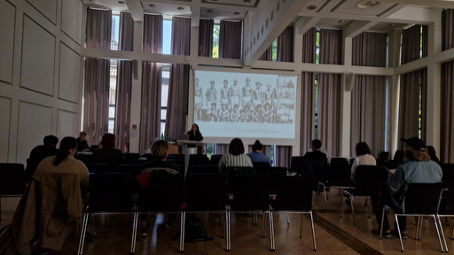Pascal Konings, PhD Researcher and ESTA Project Coordinator, International Institute of Social History, Amsterdam //
On May 9th 2025, the ESTA network workshop “From slave trade to contract labour and shipping in Asia: Digital methods and collaboration” was held at the Bonn Center for Dependency and Slavery Studies (BCDSS), as part of the larger conference “Strong Asymmetrical Dependencies: Perspectives from Asia”. This workshop built on discussions about the reconstruction of the slave trade in the wider Indian Ocean world that have taken place in various settings over the past decade. While international collaboration was set in motion with the design and implementation of the ‘Exploring the Slave Trade in Asia’ database project initiated by the International Institute of Social History, new questions have emerged and new initiatives have joined the field. Some are still in development, while others have been realised thanks to national and European funding schemes. So, the aim of this workshop was to bring together current initiatives and ongoing projects to discuss common issues, with a specific focus on conceptual and digital challenges.

During the workshop, presenters that are involved in these initiatives reflected upon conceptual and historiographical challenges of projects such as the Pacific People Trading Database (Emma Christopher, UNSW), the Global Business of Slave Trade (Filipa Ribeiro da Silva, IISH) and the China Human Trafficking and Slaving Database (Claude Chevaleyre, CNRS), as well as topics like slaving in Macao (Philipp Huber, IISH) and the eastern Indonesian Archipelago (Hans Hägerdal, Linnaeus University). The presenters shared their perspectives on developments and on how various coerced labour regimes could be studied. Then, more project presenters followed, who focused on the ‘toolbox’ – or practicalities – of their initiatives. For example, Brecht Nijman (Huygens Institute) discussed preliminary work on a database of intra-Asiatic shipping, while our very own Britt van Duijvenvoorde (IISH) showed her research on slave trade on the Coromandel Coast in the 17th and 18th centuries. The ESTA project itself was represented by this author (IISH) and Aleksandra Modelina (BCDSS), who discussed the history, goals and future of the project, with Aleksandra focusing on ESTA’s new data entry interface and her experience working with it.
After a well-deserved lunch, the attention shifted to Susana Münch Miranda’s project Reassessing Global Trade: Eurasian Trade via Lisbon, 1770-1830, or EURALIS (NOVA University Lisbon). In a similar vein, George Bryan Souza (University of Texas, San Antonio) joined online to talk about his work surrounding Portuguese Asiatic Shipping: Outward, Homeward and intra-Asian Voyages, c. 1668 to c. 1842, while sharing source material he based his research on, as well as the archives that contain them. When Alexander Ermakov (Bonn Center for Digital Humanities) shared his valuable feedback on the projects, a lively discussion emerged on the state of the field of digital humanities, including the challenges as well as opportunities that the latest digital methods bring to the field of (global) slavery studies – think for example of the use of artificial intelligence to extract large-scale slave trade data from colonial source material, while such a scale simultaneously complicates manual data curation. Ways to start new collaborations and strengthen existing ones were discussed; its importance was echoed by many.
More information about the ESTA project can found here.